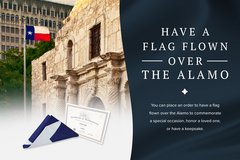A delegation of Texas officials contacted General David E. Twiggs, a decorated officer who commanded the Military District of Texas. Twiggs had anticipated Texas’ secession and asked his superiors in Washington, D.C. for instructions. He let it be known to his superiors that he was not prepared to fire on fellow Americans unless forced to defend his post and the nation’s honor. Twiggs received no answer from Washington. Without direction, Twiggs was left on his own to decide what to do. Twiggs told the Texan commissioners that he would turn over the public property they sought if his men were allowed to leave Texas under arms. The fact that Twiggs was a Georgia-born southerner who didn’t believe that the Union could or should be preserved by force comforted the commissioners but worried his superiors. As discussions between Twiggs and the Texans were underway, Twiggs received word that pro-Union officer, Colonel Carlos A. Waite, was replacing him as commander of the Military District of Texas. The commissioners decided they could not wait for the change to take place and called for immediate action.
Ben McCulloch, who had an impressive military record in the service of Texas, was asked to organize a battalion of volunteers to seize San Antonio. Many of the volunteers were former Texas Rangers who had fought against Mexico and the Comanche and Apache. On the afternoon of February 15, 1861, McCullouch’s men began moving towards San Antonio. Both Twiggs and McCulloch were careful not to bring on a fight, knowing the incident would have serious consequences for the nation. On the morning of February 16. the federal soldiers discovered that McCulloch had positioned men on the rooftops overlooking the army installations at the Alamo. Any resistance by the 160-man federal garrison against the thousand or so Texans commanded by McCulloch seemed futile.
As the day wore on, the Texas commissioners contacted Twiggs and again demanded the public property in his possession. He replied that he would not give up the arms in the hands of his soldiers — which in his mind would amount to a capitulation — but would order San Antonio evacuated and send an order for all U.S. troops to leave Texas. The commissioners accepted his terms, thus postponing the first battle of the Civil War by two months.



![David E. Twiggs, ca. 1860. LC-B813- 6776 A [P&P]. Library of Congress Prints and Photographs Division.](/fileadmin/_processed_/6/9/csm_david_e_twiggs_ef1618ed71.jpeg)


